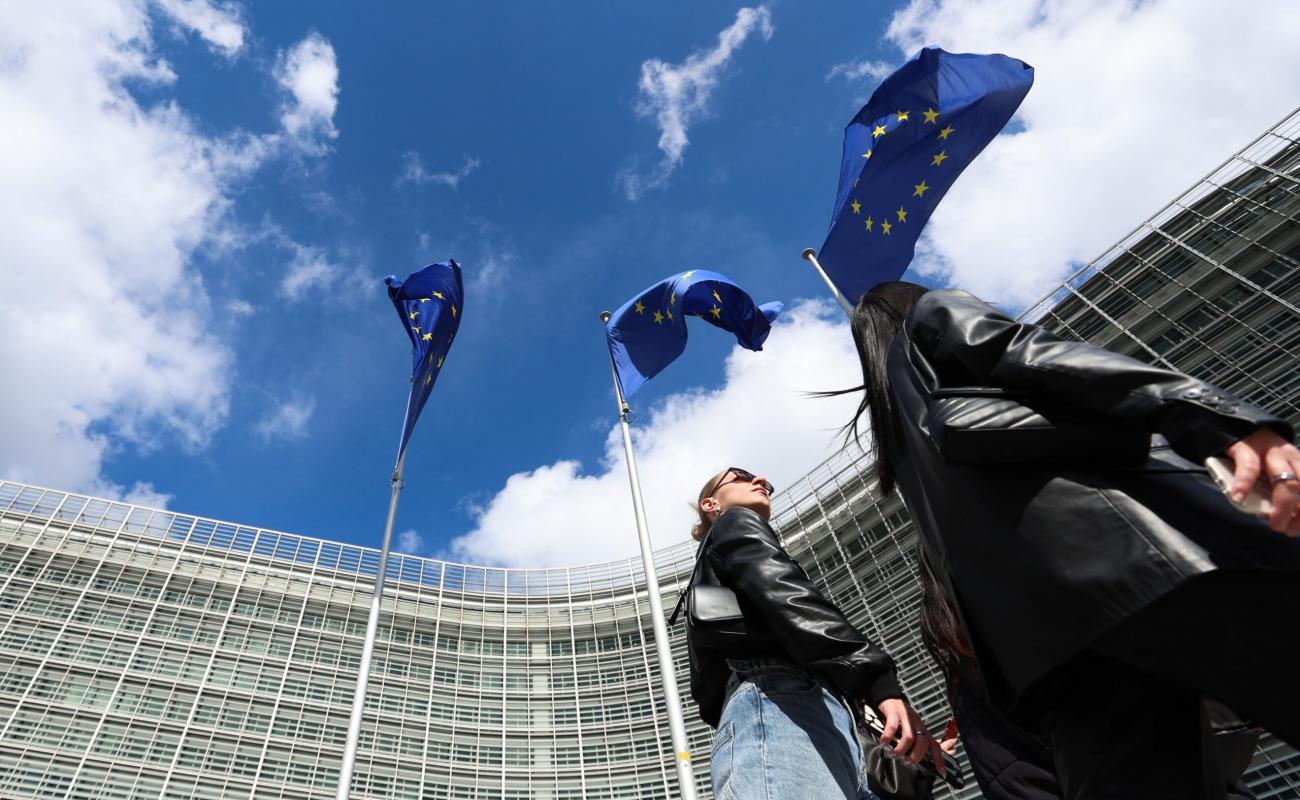Russian influence scandal rocks EU

Pro-Kremlin website spread propaganda and “paid” European politicians, top European officials said.
A Russian political influence campaign is shaking up Europe, as top officials warned Moscow paid European Parliament members to interfere in the upcoming EU election.
"This confirms what we have suspected: the Kremlin is using dodgy outlets pretending to be media [and] using money to buy covert influence,” European Commission Vice President Věra Jourová told Brussels Playbook, calling the revelations “very troubling.”
The scandal broke when the Czech government on Wednesday sanctioned a news site called Voice of Europe, which Prague said was part of a pro-Russian influence operation. Belgian Prime Minister Alexander De Croo said Thursday that Russia had approached EU parliament members (MEPs) and "paid [them], to promote Russian propaganda.”
The new Russian influence campaign comes with less than three months to go before the European Parliament election on June 6-9. It echoes concerns of corruption and foreign meddling brought to the fore by the Qatargate corruption scandal that rocked the European Parliament less than two years ago.
"We can't afford to be one step behind Putin and his propaganda army on a chess board ... We have to constantly bear in mind he will use the disinformation and foreign interference as a weapon to divide Europe," Jourová said.
The influence scandal revolved around the website Voice of Europe. The Czech foreign ministry sanctioned Ukrainian oligarch Viktor Medvedchuk, an ally of Russian President Vladimir Putin, as well as Voice of Europe itself and a person called Artem Pavlovich Marchevskyi presumed to be involved in the operation.
Medvedchuk was running a “Russian influence operation” from Russia on Czech territory using Voice of Europe, authorities said in a statement.
“This decision is in the security interest of the Czech Republic, as well as contributing to the protection of the democratic nature of the forthcoming elections to the European Parliament,” the Czech foreign ministry said.
Polish security services said Thursday they had carried out searches as part of the cross-border investigation in Warsaw and Tychy in western Poland, Reuters reported. Local media cited the security services' statement saying authorities had seized €48,500 and $36,000. Poland's Internal Security Agency's website has been down since Thursday evening.
Voice of Europe’s YouTube page throws up a parade of EU lawmakers, many of them belonging to far-right, Euroskeptic parties, who line up to bash the Green Deal, predict the Union’s imminent collapse, or attack Ukraine. There is no suggestion that those appearing on the network accepted cash.
The website has its roots in the Netherlands, Dutch daily NRC reported. An entrepreneur linked to the site at the time “worked with” far-right leader Thierry Baudet in 2016 “to bring about the Ukraine referendum,” the paper wrote, referring to a non-binding vote in which Dutch voters opposed a political association agreement between Ukraine and the EU.
Voice of Europe’s website was unavailable on Thursday and its account on X hasn’t posted since Wednesday.
"It is just a bitter joke to call this operation of Russian interference the 'Voice of Europe' but it shows clearly the level of despise Putin has towards our democracies," Jourová said.
The claim that MEPs were paid to speak up for the Kremlin has raised questions about who might have taken the cash.
A spokesperson for European Parliament President Roberta Metsola said in a statement: “The president is aware of the allegations being made and is looking into specific allegations.”
Italian European People's Party lawmaker Matteo Gazzini, who gave Voice of Europe an interview and participated in a panel debate alongside other MEPs, denied being offered or taking any money.
“Of course not, what a question is this?” he said. “It makes me laugh when you ask me if I got money from Russia … because I come from a very well-off family,” he said, adding that he is an agricultural and real estate entrepreneur who is only in politics to serve his country.
Asked about his comments on a Voice of Europe panel in which he said that Europe should not have the goal of defeating Russia, and instead focus on finding a path to peace in Ukraine, Gazzini said he condemned the invasion and that Russian troops should leave Ukraine. “At the same time, Europe should not help to escalate the situation,” he said.
He also blamed the European Parliament for letting Voice of Europe into the institution, where he said they first approached him. “If they are such a big threat, why [did] the European Parliament let these journalists inside? Why didn’t they check them?” he asked.
His EPP colleague Dennis Radtke, from Germany, said that Gazzini’s membership of the political group “has to be discussed.” Gazzini joined the EPP this year from the far-right Identity & Democracy grouping, having quit his League party to join Forza Italia.
“It underlines my skepticism with former members of Lega and the ID. Whoever is involved in this Russian network has to face consequences ... We have to defend our democracy and the integrity of our political institution,” Radtke wrote in a message.
A senior EPP group official said: “The EPP stands clearly and firmly on the side of Ukraine. We have been fighting against Putin‘s propaganda and disinformation for years and we will continue to do so.”
The S&D group joined others in calling for an urgent debate.
